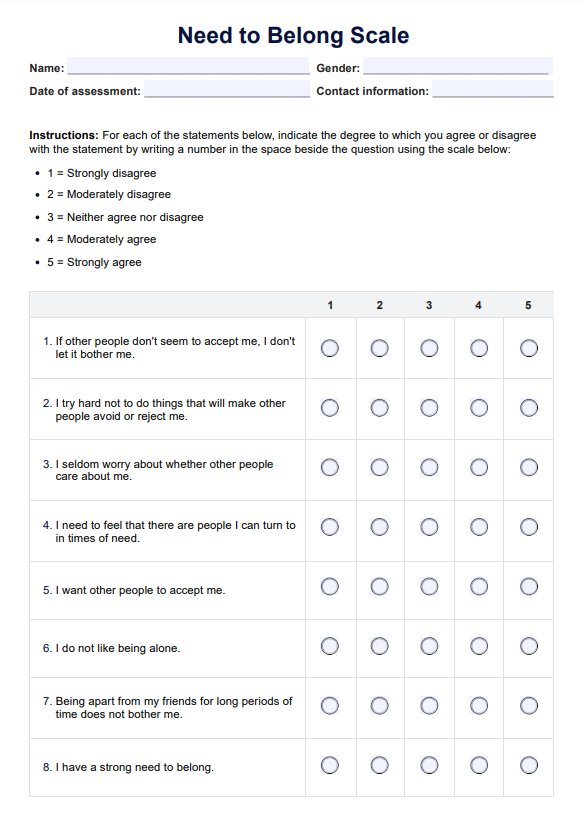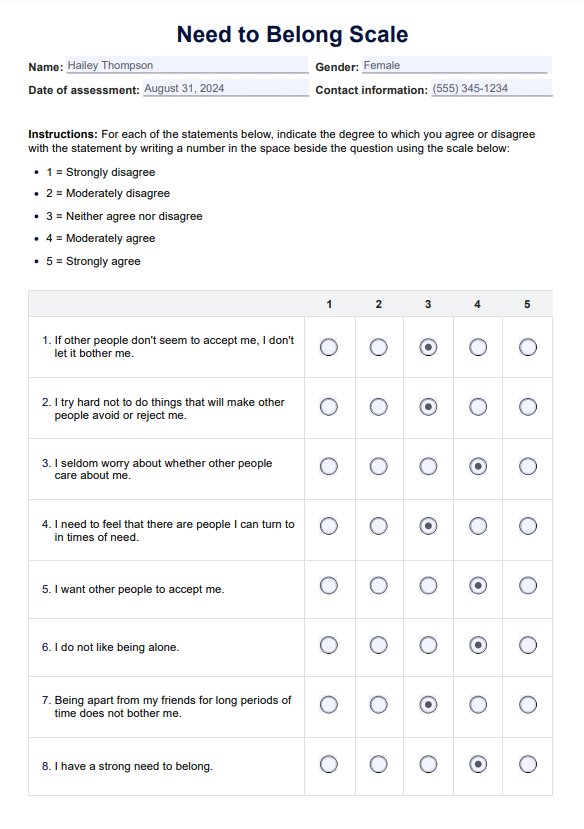Need to Belong Scale
Explore the Need to Belong Scale, its significance, and how to measure a sense of belonging. Download our free PDF example to use in your practice today.


What is the sense of belongingness theory?
The sense of belongingness theory, also known as the need to belong theory, is a fundamental concept in social psychology that explains the human drive for social connection and acceptance. This theory, proposed by Roy Baumeister and Mark Leary in 1995, posits that humans have an innate and pervasive motivation to form and maintain at least a minimum number of positive, significant interpersonal relationships.
At its core, the theory suggests that the need to belong is a fundamental human motivation, as essential to our well-being as food and shelter. This need is characterized by two main features:
- People require frequent, positive interactions with others.
- These interactions must occur within a framework of long-term, stable care and concern.
The sense of belongingness theory has important implications for understanding human behavior, emotions, and mental health. When individuals feel a strong sense of belonging, they tend to experience positive emotions and better overall well-being. This belongingness is also linked to prosocial relating behaviour.
Conversely, when this need is not met, it can lead to feelings of loneliness, social isolation, anxiety, depression, and other negative psychological outcomes.
Need to Belong Scale Template
Need to Belong Scale Example
What is the Need to Belong Scale?
The Need to Belong Scale (NTBS) is a psychological assessment tool designed to measure an individual's desire for acceptance and belonging in social relationships. Developed by Leary, Kelly, Cottrell, and Schreindorfer in 2013, this scale provides a quantitative measure of the fundamental human need to form and maintain interpersonal connections, as proposed in Baumeister and Leary's belongingness theory. Previous research also associates this appraisal of social worthiness with measures of the qualities of relationships (Pillow et al., 2015).
What does the Need to Belong Scale measure?
The Need to Belong Scale measures an individual's desire for interpersonal relationships. This can then be a helpful tool for healthcare professionals, including psychologists and mental health practitioners, through the following ways:
Assessing prosocial relating behavior
The NTBS provides a comprehensive assessment of prosocial behavior and emotional self-expression. It focuses on how individuals connect with others and navigate their social environments.
Evaluating emotional self-expression
By examining dimensions of social worthiness, the NTBS evaluates emotional self-expression and perceptions of exclusion and shame, offering a holistic view of relational dynamics.
Exploring the sense of belongingness
This scale helps professionals understand the extent to which individuals feel accepted or excluded in their social circles, emphasizing the importance of a sense of belongingness.
The impact of social identity
Furthermore, the NTBS highlights critical aspects of social identity and interpersonal attachments, revealing how exclusion and shame influence mental health.
Fostering social acceptance
Insights from the NTBS enable professionals to create supportive environments that foster healthy self-expression and enhance prosocial relating behavior, underscoring the significance of belonging in overall well-being.
Improving self-esteem through social relationships
The Need to Belong Scale is vital for understanding and improving social acceptance and relationships, ultimately contributing to greater self-esteem and emotional health.
How does this template work?
The Need to Belong Scale is a valuable tool for assessing an individual's desire for social connection and acceptance. Here's a concise guide on how to implement this scale in your practice:
Step 1: Administration
Present the 10-item NTBS questionnaire to your client. Each item is rated on a 5-point Likert scale, ranging from 1 (strongly disagree) to 5 (strongly agree). Ensure a quiet, comfortable environment for completion.
Step 2: Scoring
Calculate the total score by summing all item responses after reverse-scoring items 1, 3, and 7. The final score can range from 10 to 50, with higher scores indicating a stronger need to belong.
Step 3: Interpretation
Evaluate the score in the context of the client's history and current circumstances. Higher scores may suggest a greater sensitivity to social exclusion or a stronger drive for interpersonal relationships.
Step 4: Application
Use the results to inform treatment planning. For clients with high scores, consider interventions that address social skills, relationship building, or coping strategies for social anxiety. For those with lower scores, explore their social support networks and satisfaction with current relationships.
Scoring and interpretation
To calculate the total score, sum the ratings for all 10 items. Higher total scores indicate a stronger need to belong, while lower scores suggest a greater comfort with independence and solitude.
The following interpretation can also be offered:
- High scores: Individuals with high scores tend to prioritize their group memberships and seek to establish strong connections with others.
- Low scores: Those with low scores may feel more comfortable being alone and less concerned about social acceptance.
It’s important to note that high and low scores have advantages and disadvantages, and the interpretation of results should consider the individual's context and experiences.
Next steps after using the Need to Belong Scale
Once healthcare professionals have administered the NTBS, it’s crucial to delve into the results to identify specific areas where individuals may need support. Understanding the results can help assess individual differences in social acceptance and relationships, as well as appraisals of exclusion and shame concerning social worthiness.
Assessing social value representation
Next, practitioners should explore how individuals socially self-represent themselves and their appraisals of social worthiness. This involves examining their sense of belongingness and how they perceive their value within their social relationships. Such appraisals can significantly influence emotional self-expression and prosocial-relating behavior.
Understanding an individual's appraisals of exclusion, shame, social worthiness, and related constructs can offer insights into their approach or avoidance orientations in social situations. This knowledge can guide interventions to improve social skills and foster positive interpersonal relationships.
Developing tailored interventions
Based on the NTBS results and subsequent assessments, practitioners can develop tailored interventions to address specific needs related to belongingness and social exclusion. For individuals with a high need to belong, interventions might focus on:
Enhancing social skills to help obtain satisfying relationships
To enhance interpersonal connections for individuals with lower NTBS scores, it’s crucial to implement targeted strategies. These may include:
- Developing coping strategies for feelings of exclusion or rejection.
- Improving emotional self-expression in social situations.
- Encouraging prosocial behaviors to strengthen relationships.
Additionally, interventions should focus on:
- Exploring the quality of existing relationships.
- Addressing underlying issues related to social avoidance or discomfort.
- Enhancing self-esteem and self-worth independent of social validation.
By incorporating these approaches, clients can achieve satisfying interpersonal relationships and cultivate the skills necessary to maintain them over time. Healthcare professionals play a vital role in improving their patients' mental health outcomes and overall quality of life by addressing the fundamental need to belong and promoting social value representation.
Reference
Pillow, D. R., Malone, G. P., & Hale, W. J. (2015). The need to belong and its association with fully satisfying relationships: A tale of two measures. Personality and Individual Differences, 74(74), 259–264. https://doi.org/10.1016/j.paid.2014.10.031
Commonly asked questions
The Need to Belong Scale (NTBS) measures individual differences in the motivation to feel accepted and connected to others. It consists of 10 items rated on a 5-point Likert scale, assessing how strongly individuals desire interpersonal relationships and their sensitivity to social exclusion.
The need-to-know theory emphasizes that social connections are essential for emotional well-being and that the desire for acceptance and belonging influences behavior, motivations, and psychological health.
The psychological needs of belonging encompass the desire for social acceptance, emotional connection, and interpersonal relationships. These needs are fundamental to human motivation and well-being.

.jpg)



















-template.jpg)


















































































